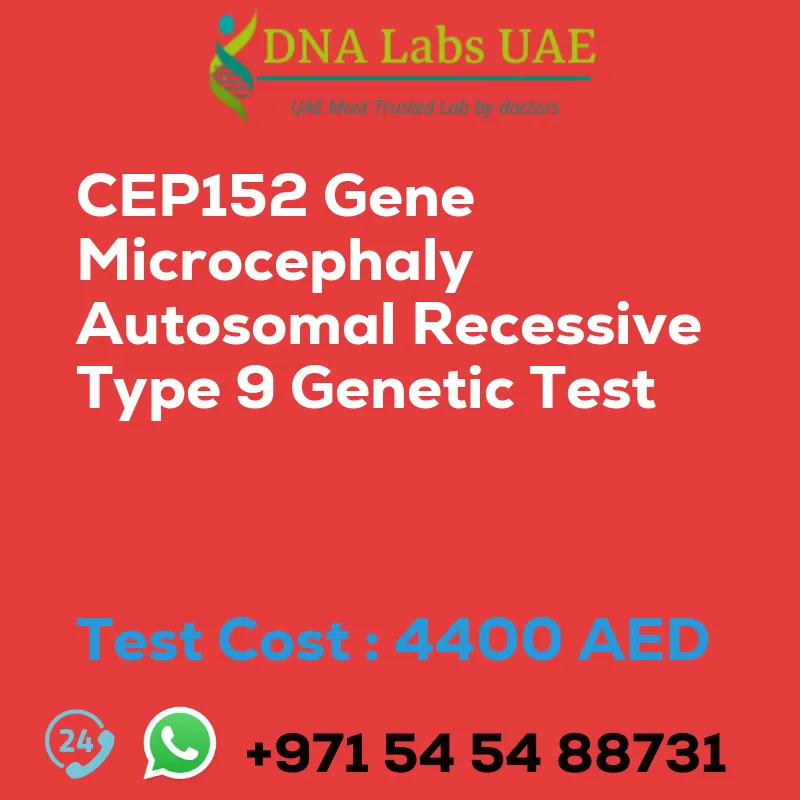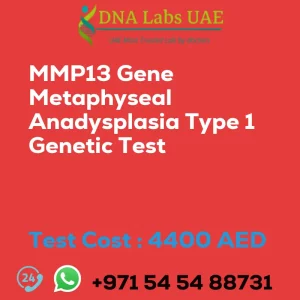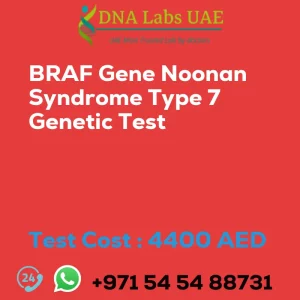CEP152 Gene Microcephaly autosomal recessive type 9 Genetic Test
Components: CEP152 Gene Microcephaly autosomal recessive type 9 Genetic Test
Price: 4400.0 AED
Sample Condition: Blood or Extracted DNA or One drop Blood on FTA Card
Report Delivery: 3 to 4 Weeks
Method: NGS Technology
Test Type: Dysmorphology
Doctor: Pediatrics
Test Department: Genetics
Pre Test Information: Clinical History of Patient who is going for CEP152 Gene Microcephaly, autosomal recessive type 9 NGS Genetic DNA Test. A Genetic Counselling session to draw a pedigree chart of family members affected with CEP152 Gene Microcephaly, autosomal recessive type 9 NGS Genetic DNA Test gene CEP152
Test Details: CEP152 (Centrosomal Protein 152) is a gene that plays a crucial role in cell division and the formation of centrosomes, which are important for organizing the microtubules that help cells divide. Mutations in the CEP152 gene have been associated with a form of microcephaly known as autosomal recessive type 9 (MCPH9). Microcephaly is a condition characterized by a smaller than average head size and reduced brain growth. In the case of MCPH9, individuals typically have severe microcephaly, intellectual disability, and developmental delays. Other features may include facial abnormalities, short stature, and seizures.
NGS (Next-Generation Sequencing) genetic testing is a method used to analyze the DNA sequence of genes, including the CEP152 gene, to identify any mutations or variants that may be present. This type of testing can help in diagnosing genetic conditions, such as MCPH9, by identifying specific genetic changes that may be causing the symptoms. If a person is suspected to have MCPH9, a geneticist or other healthcare professional may recommend NGS genetic testing to confirm the diagnosis. This involves collecting a sample of the person’s DNA, usually through a blood or saliva sample, and sending it to a laboratory for analysis. The laboratory will use NGS technology to sequence the DNA and look for any mutations or variants in the CEP152 gene.
The results of the NGS genetic test can provide valuable information for diagnosis, prognosis, and potential treatment options. It can also help in providing genetic counseling to the individual and their family members regarding the inheritance and recurrence risks of MCPH9. It is important to note that genetic testing should always be done under the guidance of a healthcare professional, who can help interpret the results and provide appropriate support and guidance.
| Test Name | CEP152 Gene Microcephaly autosomal recessive type 9 Genetic Test |
|---|---|
| Components | |
| Price | 4400.0 AED |
| Sample Condition | Blood or Extracted DNA or One drop Blood on FTA Card |
| Report Delivery | 3 to 4 Weeks |
| Method | NGS Technology |
| Test type | Dysmorphology |
| Doctor | Pediatrics |
| Test Department: | Genetics |
| Pre Test Information | Clinical History of Patient who is going for CEP152 Gene Microcephaly, autosomal recessive type 9 NGS Genetic DNA Test. A Genetic Counselling session to draw a pedigree chart of family members affected with CEP152 Gene Microcephaly, autosomal recessive type 9 NGS Genetic DNA Test gene CEP152 |
| Test Details |
CEP152 (Centrosomal Protein 152) is a gene that plays a crucial role in cell division and the formation of centrosomes, which are important for organizing the microtubules that help cells divide. Mutations in the CEP152 gene have been associated with a form of microcephaly known as autosomal recessive type 9 (MCPH9). Microcephaly is a condition characterized by a smaller than average head size and reduced brain growth. In the case of MCPH9, individuals typically have severe microcephaly, intellectual disability, and developmental delays. Other features may include facial abnormalities, short stature, and seizures. NGS (Next-Generation Sequencing) genetic testing is a method used to analyze the DNA sequence of genes, including the CEP152 gene, to identify any mutations or variants that may be present. This type of testing can help in diagnosing genetic conditions, such as MCPH9, by identifying specific genetic changes that may be causing the symptoms. If a person is suspected to have MCPH9, a geneticist or other healthcare professional may recommend NGS genetic testing to confirm the diagnosis. This involves collecting a sample of the person’s DNA, usually through a blood or saliva sample, and sending it to a laboratory for analysis. The laboratory will use NGS technology to sequence the DNA and look for any mutations or variants in the CEP152 gene. The results of the NGS genetic test can provide valuable information for diagnosis, prognosis, and potential treatment options. It can also help in providing genetic counseling to the individual and their family members regarding the inheritance and recurrence risks of MCPH9. It is important to note that genetic testing should always be done under the guidance of a healthcare professional, who can help interpret the results and provide appropriate support and guidance. |








